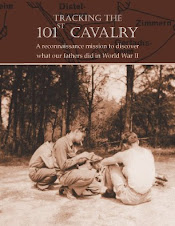I thought that once the book was done, I'd have to put the 101st Cavalry behind me. Nothing could have been further from the truth. I continued to hear from the veterans and their families, and I have received many additional stories and photos.
In April last year (yes, I am at least that far behind), I heard from James Davis, who told me about his grandfather, Madison W. Davis, Virginia, who served in Troop B, 101st Squadron. He wrote that he had the cloth map his grandfather had carried, and which he had used to sketch a map for the route the 101st took across Europe.
“Papa never just openly sat down and started talking about the war,” James wrote. “He was usually inspired by something that was related, like a television show, war movie, etc. He would give a short little description of something he went through. I remember one [story] in particular about the rifle he was issued. We were talking about deer hunting one day, and he got off on the subject of caliber. He said he was issued an M1 Carbine and that it lacked stopping power tremendously. He did not want to carry that rifle into any more battles, because he said it would not stop a grown man when he was coming at you. I knew right then he answered the question everybody wants to know: Did you ever have to kill anyone. He didn’t come out and say it, but that’s what it meant. He traded off with an officer who wouldn’t need a high-powered weapon and said the M1 Garand was much better at stopping Germans; one shot would do it. I left it at that. I was 15 when he died and just starting to get interested in the past.”
James said his grandfather also didn’t care much for the jets.
“He recalled the bombing and strafing they dealt with,” wrote James, “which were brought on by the #%*&%# jets as he put it.”
Madison also told his grandson about carrying Ivy Fields out of a mine field that had walked into. The men thought they were being shelled by mortar fire, but the noise was other men setting off mines. Several men fell to the ground for cover, but they, too, fell on mines and were injured. As Madison carried Ivy out, he could tell Ivy was alive because he could see his breath in the cold air.
“Papa still had a dollar bill that he carried in his pocket during the entire tour of Europe that was signed by all the troop B 101st guys.”
Madison Davis died in 2002, and many of the men he served with attended his funeral, some flying to Virginia from New York and Pennsylvania.
“Those guys were a tight bunch,” James wrote.
Tuesday, April 6, 2010
Subscribe to:
Post Comments (Atom)





No comments:
Post a Comment